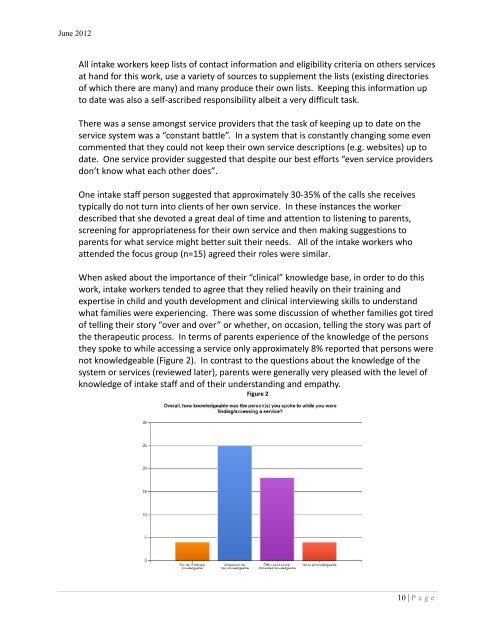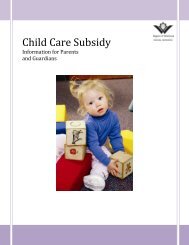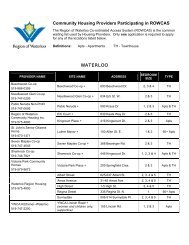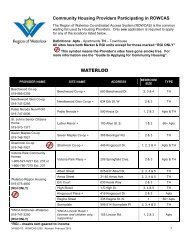Waterloo Children & Youth Services Planning ... - Social Services
Waterloo Children & Youth Services Planning ... - Social Services
Waterloo Children & Youth Services Planning ... - Social Services
Create successful ePaper yourself
Turn your PDF publications into a flip-book with our unique Google optimized e-Paper software.
June 2012<br />
All intake workers keep lists of contact information and eligibility criteria on others services<br />
at hand for this work, use a variety of sources to supplement the lists (existing directories<br />
of which there are many) and many produce their own lists. Keeping this information up<br />
to date was also a self-ascribed responsibility albeit a very difficult task.<br />
There was a sense amongst service providers that the task of keeping up to date on the<br />
service system was a “constant battle”. In a system that is constantly changing some even<br />
commented that they could not keep their own service descriptions (e.g. websites) up to<br />
date. One service provider suggested that despite our best efforts “even service providers<br />
don’t know what each other does”.<br />
One intake staff person suggested that approximately 30-35% of the calls she receives<br />
typically do not turn into clients of her own service. In these instances the worker<br />
described that she devoted a great deal of time and attention to listening to parents,<br />
screening for appropriateness for their own service and then making suggestions to<br />
parents for what service might better suit their needs. All of the intake workers who<br />
attended the focus group (n=15) agreed their roles were similar.<br />
When asked about the importance of their “clinical” knowledge base, in order to do this<br />
work, intake workers tended to agree that they relied heavily on their training and<br />
expertise in child and youth development and clinical interviewing skills to understand<br />
what families were experiencing. There was some discussion of whether families got tired<br />
of telling their story “over and over” or whether, on occasion, telling the story was part of<br />
the therapeutic process. In terms of parents experience of the knowledge of the persons<br />
they spoke to while accessing a service only approximately 8% reported that persons were<br />
not knowledgeable (Figure 2). In contrast to the questions about the knowledge of the<br />
system or services (reviewed later), parents were generally very pleased with the level of<br />
knowledge of intake staff and of their understanding and empathy.<br />
Figure 2<br />
10 | P a g e
















